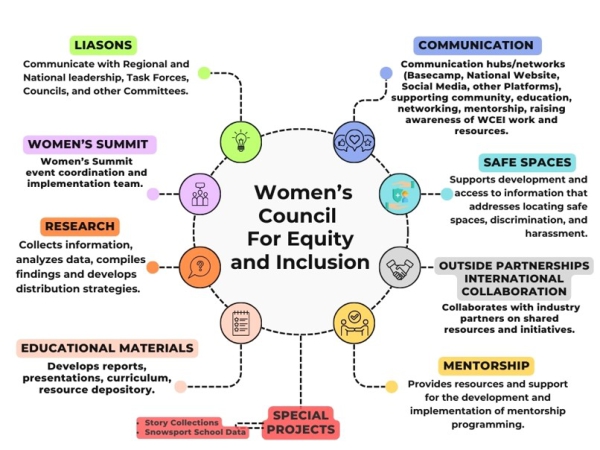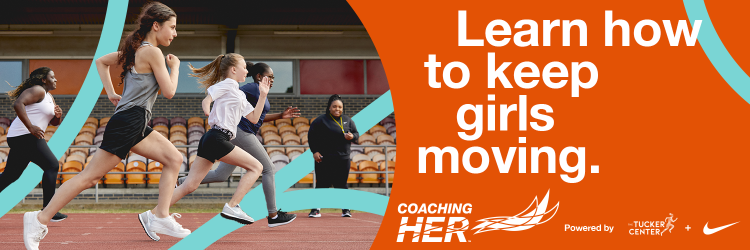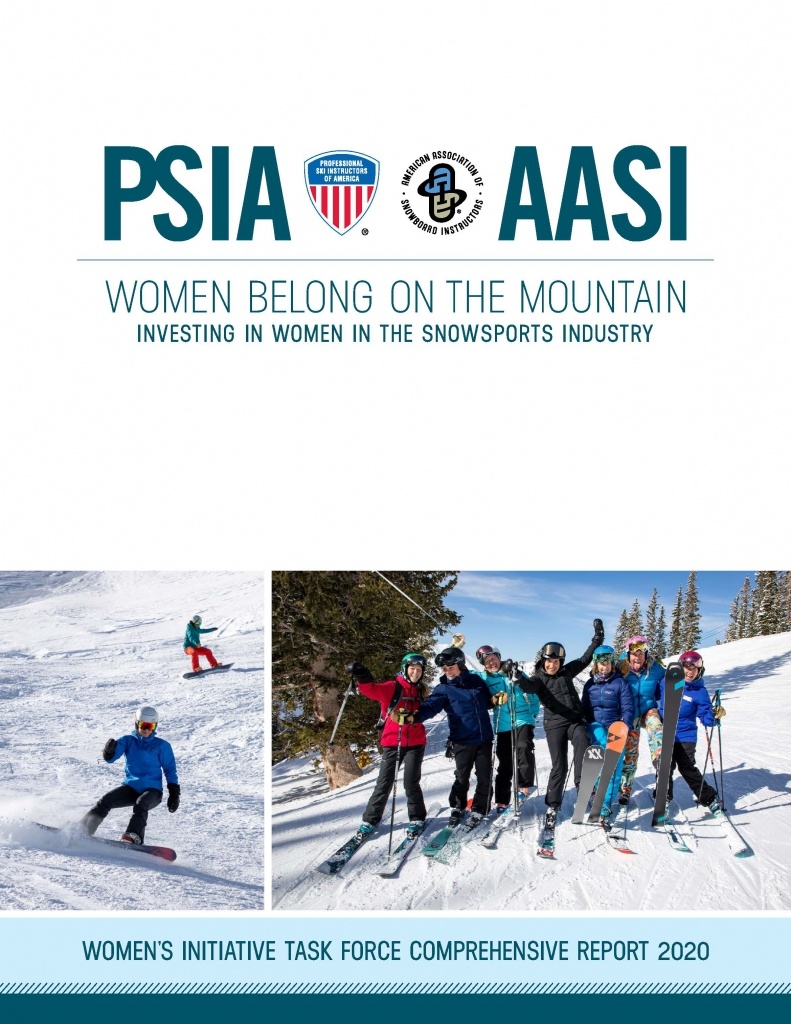Our Commitment to Women in Snowports
PSIA-AASI is committed to inclusion and helping everyone advance in the snowsports industry. We work to promote strategies and best practices to ensure women’s educational opportunities and to increase women’s representation at all leadership levels. We promote actions to empower women, to retain them in the industry, and to enhance their professional development. These actions strengthen PSIA-AASI’s culture so all women experience an inclusive educational and professional snowsports environment.

- Created the Women’s Council for Equity and Inclusion.
- Worked with a research firm to survey female members about their PSIA-AASI and snowsports industry experiences and presented the report’s key findings in the Women Belong on the Mountain report.
- Reestablished the Women’s Summit as a national event.
- Developed the Women’s Virtual Summit.
- Partnered with Women of Winter to host instructor training and certification events for Black, Indigenous, Women of Color that will encourage and support Women of Color to pursue opportunities to teach skiing or snowboarding.
- Provided hundreds of women educational funding through the Nancy Oakes Hall Women’s Scholarship (ongoing).
- Developed a mentorship program best practices resource for member schools, regions, or groups to create their own mentorship programs
- Analyzed national membership data to measure and track progress through time across disciplines and certification levels
- In partnership with regional CEOs, implement a national mentorship program for aspiring women leaders to support career pathways on and off snow.
- Explore additional women’s specific scholarship opportunities and creative ideas for funding women pursuing certification.
- Create repositories of educational materials for members, trainers, and leadership,
- Develop educational materials on professional behavior and actions to ensure a safe, inclusive environment.
- Continue to collect and evaluate data on women’s participation and advancement in PSIA-AASI.
- Support efforts to collect stories of women’s experiences
- Partner with schools and system providers to capture and analyze lesson level data.
- Collaborate nationally and internationally with association partners and snowsport organizations to share resources and best practices.
- Gender Equity, What is Your Role? – Article by Canadian Women & Sport
- Professional Development of Women in Snowsports – Webinar presented by former PSIA-AASI National Team member Heidi Ettlinger (October 2021)
- What is Gender Bias in the Workplace? – Article by Bailey Reiners
- Women Belong on the Mountain – Report
- Women in the Workplace 2021 – Article by McKinsey & Company
- Women of Winter & PSIA-AASI Set the Stage for the Next Generation of Leaders – Video
- Women’s Survey Report – Article in 32 Degrees (Spring 2021)
Reach out to WCEI Chair, Maggie Loring or a Council member in your region:
- Maggie Loring
- Carol Levine
- Heidi Ettlinger
- Karen Haringa
- Keri Reid
- Kirstie Rosenfield
- Leigh Pierini
- Lezlie Pinske
- Stephanie Wilkerson
- Ying Liu
Additionally:
- Apply for the Nancy Oakes Hall Women’s Scholarship
- Attend the Women’s Summit
- Share your input with Member Services at
Download the Women's Mentorship Starter Kit
Download the Women's Understanding Mentorship PDF


What is Coaching HER™?
Coaching HER™ is an industry-first, evidence-informed, rigorously tested tool designed for sport coaches of young people who identify as girls and helps sport coaches of girls challenge the status quo and the taken-for-granted assumptions of what it means to coach girls. Coaching HER™ is girl-focused, gender-responsive, and grounded in the recognition that girls experience the world differently than boys, face many barriers, and are treated differently simply because they are girls. Creating welcoming and safe environments helps girls thrive at all ages which can grow participation, enjoyment, and reduce the critical zone of attrition (11-17) when a large majority of girls drop out of sport. When girls don’t play sport, they fail to accrue positive psychosocial, health, developmental, academic and career benefits that help her reach her full potential and thrive.
CoachingHER Resources
As educators and researchers, we know that having a well-trained, caring coach is critical to helping kids reach their potential in and through sport, and this is particularly true for girls. At the Tucker Center for Research on Girls & Women in Sport at the University of Minnesota our mission is to accelerate systems change and we are leading this effort through coach education by launching Coaching HER™ and the Body Confident Sport tools. Our research shows GIRLS DIFFER FROM BOYS, because they experience the world differently and are treated differently than boys… BECAUSE THEY ARE GIRLS. We also know that changing the system requires collaboration. Through both tools, coaches around the world will have a unique opportunity to:
- challenge and change damaging gender bias and stereotypes,
- support girls’ needs in sport,
- value all girls’ identities, and
- shift the conversation from what girls’ bodies look like to what their bodies can do.
For girls to flourish in sport, it takes knowledgeable, intentional, caring, and gender-responsive coaches. Coaching HER™ helps get and keep girls in sport. We want coaches to be the reason she stays in sport.
Coaches are a primary influence in a girl’s sports journey. They are one of the most important factors in why girls stay in, or drop out of, sports. Girls need coaches to create welcoming and safe environments to help them thrive. Coaches are often powerful transmitters of gender beliefs and norms. These gendered beliefs of sport coaches are rarely questioned and uncritically accepted as the norm. Yet these same gendered beliefs are factors in shaping girls’ negative self-perceptions and sport experiences. However, coaches are often unaware, untrained, undertrained, or lacking in the confidence to address gender stereotypes, gender identities, ways to support girls, and girls’ unique needs in relation to sport.
Gender-responsive coach education, like Coaching HER™, can help coaches develop the awareness, skills, and tools necessary to confront their own gender biases and traditional gender ideologies. We empower and educate coaches through online modules demonstrating how to coach in a way that is inclusive and supports body confidence in athletes.
The Coaching HER™ modules and materials include:
- Evidence-Based Content: Engage with materials curated to support effective coaching strategies for girls.
- Personal Reflections: Encourage growth and development through guided reflection exercises.
- Key Takeaways: Downloadable documents summarizing key points from each module.
- Actionable Items: Implement practical strategies designed to empower and enable positive change in coaching practices.
- Real-World Scenarios: Apply learning in interactive scenarios to foster practical coaching skills.
- Research-Backed Materials: All content has been pilot tested and shown to reduce coach gender bias and stereotypes, helping to keep girls engaged in sport.
Be HER Reason to Stay in Sport. Learn more www.CoachingHER.com
Coaching HER™ was developed with leading experts within a novel, collaborative academic-industry partnership. Coaching HER™ was rigorously tested and resulted in eight academic papers that underpin the rigor and prove its efficacy. Research with coaches provides proof that Coaching HER™ reduces coaches’ gender biased beliefs. Our research showed that coaches who completed Foundational Modules of Coaching HER™ exhibited lower levels of gender essentialism and stereotypes compared to coaches who did not complete Coaching HER™.
The Body Confident Sport program, three modules that upskill coaches to recognize and tackle body image and promote body confidence in athletes, is also rigorously tested. Coaches who completed the Body Confident Coaching curriculum showed increased self efficacy with body image, decreased fat-phobia, and decreased levels of gender bias. Athletes who completed the Body Confident Athletes curriculum exhibited improvements in body image and sport enjoyment.
Why is it important to understand our own bias?
Understanding our biases is crucial because biases, whether conscious or unconscious, can significantly influence our decisions, behaviors, and interactions with others. When we are unaware of our biases, we may unintentionally treat people unfairly, make assumptions based on stereotypes, or overlook important perspectives.
In a coaching context, biases can affect how we evaluate athletes, the opportunities we offer them, and how we communicate with them, potentially leading to unequal treatment and a lack of inclusivity. As a coach, it’s essential to provide all athletes with equal opportunities to succeed.
By recognizing and understanding our biases, we can take steps to minimize their impact, make more objective and fair decisions, and create a more inclusive environment where everyone feels valued and respected. This self-awareness allows us to challenge our assumptions, seek diverse viewpoints, and approach situations with greater empathy and understanding. Recognizing and addressing these biases is key to fostering a safe, inclusive, and empowering environment where girls can thrive and reach their full potential.
Some common signs of gender bias in coaching may include:
- Lower Expectations: Setting lower performance or effort expectations for female athletes compared to male athletes.
- Limited Opportunities: Giving girls fewer chances to take on critical roles, such as leading the team or participating in key plays.
- Vague Feedback: Providing less detailed, constructive feedback to girls, or offering more generic praise rather than skill-specific guidance.
- Relying on Stereotypes: Making decisions based on gender norms, such as assuming girls are less competitive or driven than boys.
- Resource Allocation: Prioritizing attention, resources, and support for boys’ teams over girls’ teams.
- Overlooking Individual Needs: Disregarding or undervaluing the unique interests, aspirations, or needs expressed by female athletes.
- Focusing on Appearance: Placing undue emphasis on girls’ physical appearance rather than their skills, effort, and athletic performance.
By being aware of these signs, coaches can take proactive steps to ensure their coaching practices are equitable and supportive. Engaging in gender equity training, seeking feedback from athletes, and regularly reflecting on coaching methods can help build a more inclusive environment where all athletes have the chance to excel.
What Strategies Can I Use to Minimize the Influence of Bias in Coaching Decisions?
Minimizing the influence of bias in coaching requires intentional reflection and a commitment to fair and inclusive practices. Here are strategies to help reduce bias in your decision-making:
- Reflect on Your Biases: Regularly examine your own assumptions, biases, and stereotypes. Acknowledge that everyone has biases, and take responsibility for identifying and addressing them.
- Commit to Ongoing Education: Engage in continuous learning about diversity, equity, and inclusion. Understanding the diverse backgrounds, perspectives, and experiences of your athletes helps you recognize and challenge bias in your coaching.
- Use Objective Criteria: Set clear, merit-based criteria for evaluating performance. Ensure all athletes are assessed fairly, focusing on their skills and effort rather than personal assumptions or biases.
- Involve Others in Decision-Making: Collaborate with trusted colleagues or assistant coaches to provide diverse perspectives and challenge potential biases. Having more voices involved helps create a more balanced, inclusive decision-making process.
- Pause and Reflect Before Decisions: Before making decisions, take a moment to ask yourself if unconscious biases might be influencing your choices. Consider whether you would make the same decision if the athlete had a different identity or background.
- Encourage Feedback from Athletes: Create a culture where athletes feel comfortable sharing feedback and their experiences. Listening to their perspectives helps you build a more inclusive and supportive team environment that values fairness and diversity.
To continue learning how to coach girls more effectively and deepen your understanding of unconscious biases, visit CoachingHER.com foundational modules 2. Challenging Gender Stereotypes and 3. Coaching Girls for expert resources and tools to help create a more inclusive and supportive environment for all female athletes.


